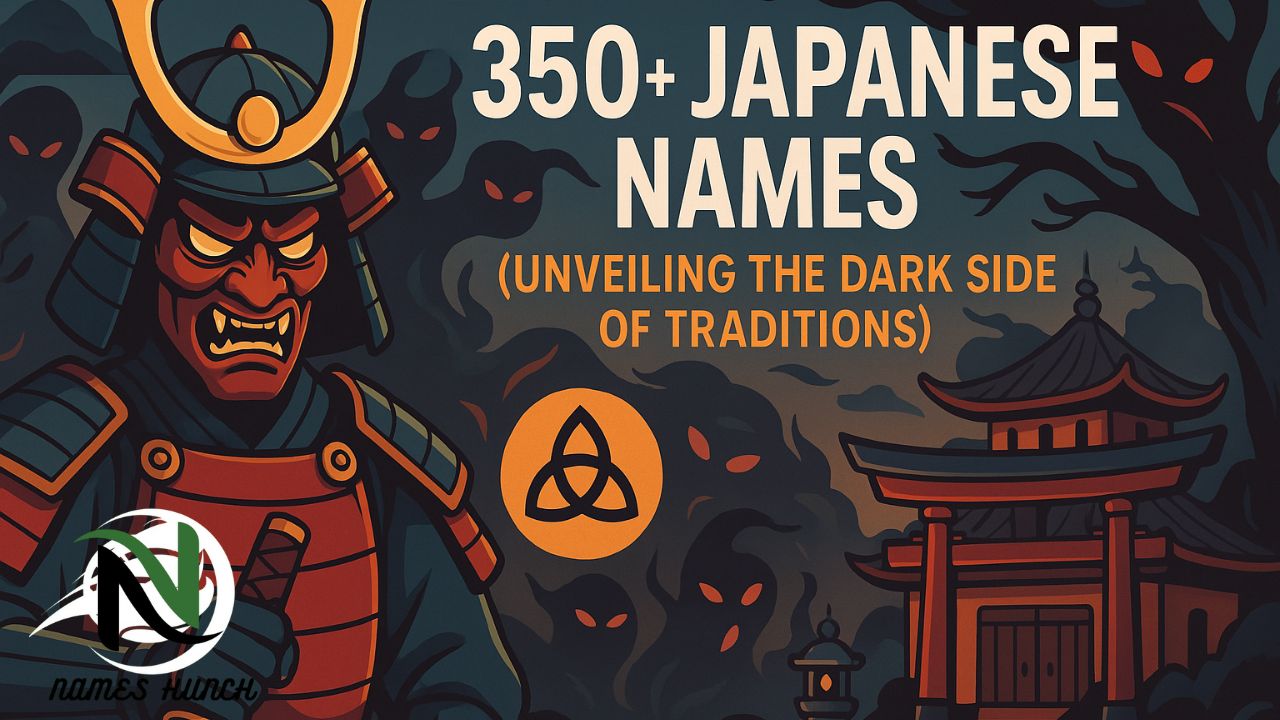Japanese names are more than just labels. They carry deep meanings and reflect rich cultural traditions. Each name is often chosen carefully, based on the meanings of its kanji characters.
Why are Japanese names so meaningful? These names often have a connection to nature, virtues or ancestors. What do these names reveal about Japanese culture?
Some names have darker meanings. Certain names are linked to death, misfortune or the afterlife. This adds a mysterious layer to the tradition.
Cool Japanese Names
Cool names often have unique meanings and sounds. They reflect creativity, nature or strength. Many parents choose names that sound stylish and modern. These names stand out and often carry deep cultural significance.
- Aiden (アイデン)
- Haruki (陽輝)
- Kairo (海翔)
- Sora (空)
- Ren (蓮)
- Sakura (桜)
- Kenta (健太)
- Miko (美子)
- Daiki (大輝)
- Yumi (由美)
- Niko (仁子)
- Ryuu (竜)
- Emi (恵美)
- Yuki (雪)
- Akira (明)
- Kai (海)
- Rei (礼)
- Hana (花)
- Isamu (勇)
- Tsubasa (翼)
- Haruto (陽翔)
- Mei (芽衣)
- Taro (太郎)
- Kyoko (京子)
- Shiro (白)
- Ayumi (歩美)
- Taichi (太一)
- Aiko (愛子)
- Riko (理子)
- Yuto (優斗)
Common Japanese Names
Popular names include Haruto, Yuki and Sakura. These names reflect nature, seasons or positive traits. Many families choose names that carry good wishes for the future.
- Haruto (陽翔)
- Yui (結衣)
- Sora (空)
- Hana (花)
- Ren (蓮)
- Mei (芽衣)
- Kaito (海斗)
- Daiki (大輝)
- Emi (恵美)
- Yuto (優斗)
- Yuka (優花)
- Takuya (拓也)
- Mei (美絵)
- Haruka (遥)
- Naoki (直樹)
- Aoi (葵)
- Yuuto (悠翔)
- Miku (未来)
- Tsubasa (翼)
- Natsuki (夏希)
- Riko (莉子)
- Kenta (健太)
- Sakura (桜)
- Ryuji (竜司)
- Airi (愛莉)
- Kana (香菜)
- Keita (啓太)
- Ayumi (歩美)
- Takumi (匠)
- Mio (美桜)
Also Visit Here: Best Pun Names
Cute Japanese Names
Many of these names are inspired by nature, animals or lovely traits. They are popular for pets, characters and children in Japan. Names like “Hana” (flower) and “Momo” (peach) are examples of cute simple names.
- Emi (恵美)
- Hana (花)
- Yumi (由美)
- Suki (スキ)
- Miko (美子)
- Aiko (愛子)
- Nami (波)
- Riko (理子)
- Akira (明)
- Niko (ニコ)
- Kiko (希子)
- Tsubaki (椿)
- Fumi (文)
- Kiyomi (清美)
- Chika (千佳)
- Haru (春)
- Yuki (雪)
- Mei (芽衣)
- Sora (空)
- Rina (里奈)
- Ayumi (歩美)
- Momo (桃)
- Hina (陽菜)
- Kohana (小花)
- Asuka (明日香)
- Yuna (優奈)
- Aira (アイラ)
- Sakura (桜)
- Miku (美空)
- Mio (美桜)
Japanese Names and Meanings
Japanese names often reflect nature, virtues or family heritage. The meaning comes from the kanji characters used to write them. These names can symbolize strength, beauty or peace. Parents choose names carefully as they carry deep cultural significance.
Haruto (陽翔)
- Haruto is a popular boy’s name meaning “sunlight” or “soar.”
Yume (夢)
- Yume means “dream” symbolizing hope and aspirations.
Kaito (海斗)
- Kaito is often interpreted as “ocean” and “big dipper” signifying strength.
Saki (咲き)
- Saki means “blossom” or “bloom” symbolizing beauty and new beginnings.
Takeshi (武)
- Takeshi means “warrior” associated with strength and bravery.
Airi (愛莉)
- Airi is a beautiful name meaning “love” and “jasmine” perfect for a gentle soul.
Ren (蓮)
- Ren means “lotus” symbolizing purity and enlightenment.
Kaori (香織)
- Kaori means “fragrance” often associated with beauty and elegance.
Ichiro (一郎)
- Ichiro means “first son” often given to the eldest boy in a family.
Ryu (竜)
- Ryu means “dragon” representing power and majesty.
Hikaru (光)
- Hikaru means “light” or “radiance” symbolizing brightness and hope.
Yuki (幸輝)
- Yuki can mean “happiness” or “snow” depending on the kanji.
Nao (直)
- Nao means “honesty” or “straightforward” reflecting a pure heart.
Miyu (美優)
- Miyu means “beautiful” and “gentle” symbolizing grace.
Shiro (四郎)
- Shiro means “fourth son” often used for a boy in the family.
Sayaka (紗耶香)
- Sayaka is often associated with “pure” and “beautiful” a name full of elegance.
Kiyoko (清子)
- Kiyoko means “pure child” representing innocence and purity.
Tomo (智)
- Tomo means “wisdom” or “intellect” perfect for someone who values knowledge.
Akane (茜)
- Akane means “deep red” symbolizing passion and strength.
Misaki (美咲)
- Misaki means “beautiful blossom” associated with beauty and growth.
Japanese Names Generator
- Akito (明人)
- Haruka (遥)
- Satsuki (皐月)
- Kazu (和)
- Ayane (綾音)
- Sho (翔)
- Kenta (健太)
- Aki (秋)
- Chiyo (千代)
- Makoto (誠)
- Natsuki (夏樹)
- Reiko (玲子)
- Tori (鳥)
- Nanami (七海)
- Daichi (大地)
- Rei (怜)
- Mizuki (瑞希)
- Yori (頼)
- Junko (順子)
- Kyoko (京子)
- Yuji (裕司)
- Sayuri (小百合)
- Keiko (恵子)
- Taichi (太一)
Japanese Names for Girls
- Ayaka (彩花)
- Sakura (桜)
- Nanami (七海)
- Haruka (遥)
- Yui (優衣)
- Kanna (神奈)
- Kana (加奈)
- Rika (理香)
- Megumi (恵)
- Nozomi (望)
- Kotone (琴音)
- Sora (空)
- Mizuki (美月)
- Akemi (明美)
- Sayuri (小百合)
- Emi (恵美)
- Riko (理子)
- Yuna (優奈)
- Airi (愛莉)
- Hina (陽菜)
- Fumiko (文子)
- Reina (怜奈)
- Natsuki (夏希)
- Miku (美空)
Japanee Names for Boys
- Haruki (陽生)
- Kaito (快斗)
- Daiki (大輝)
- Shun (俊)
- Sota (壮太)
- Jiro (次郎)
- Itsuki (樹)
- Naoya (直也)
- Yuji (雄二)
- Tetsuya (哲也)
- Ryusei (流星)
- Makoto (誠)
- Ryo (涼)
- Renji (蓮司)
- Yuuto (優斗)
- Koji (浩司)
- Tatsuya (達也)
- Toma (斗真)
- Eita (瑛太)
- Keiji (圭司)
- Kazuki (和輝)
- Taiki (大輝)
- Kiyoshi (清志)
- Hikaru (光)
Gender Neutral Japanese Names
Funny names are becoming more popular. These names can be used for both boys and girls. They often carry meanings related to nature, virtues or beauty. Choosing a gender-neutral name offers flexibility and reflects modern naming trends.
Aki (秋)
- Aki means “autumn” symbolizing the changing seasons and growth.
Haru (陽)
- Haru means “sun” or “spring” reflecting warmth and renewal.
Kai (海)
- Kai means “sea” representing vastness and tranquility.
Ren (蓮)
- Ren means “lotus” symbolizing purity and enlightenment.
Yu (優)
- Yu means “gentle” or “superior” carrying a sense of kindness.
Natsu (夏)
- Natsu means “summer” reflecting energy and brightness.
Sora (空)
- Sora means “sky” symbolizing freedom and endless possibilities.
Kiro (喜郎)
- Kiro means “joyful” reflecting happiness and positivity.
Yuki (雪)
- Yuki means “snow” symbolizing purity and clarity.
Mika (美香)
- Mika means “beautiful fragrance” representing elegance and grace.
Noa (乃愛)
- Noa means “love” often chosen for its gentle, affectionate meaning.
Isamu (勇)
- Isamu means “brave” symbolizing courage and strength.
Riku (陸)
- Riku means “land” symbolizing stability and grounding.
Aoi (葵)
- Aoi means “hollyhock” a plant symbolizing resilience and beauty.
Kuni (邦)
- Kuni means “country” representing patriotism and belonging.
Hiko (彦)
- Hiko means “prince” symbolizing nobility and leadership.
Yori (頼)
- Yori means “reliable” symbolizing trust and dependability.
Kaze (風)
- Kaze means “wind” representing freedom and change.
Tori (鳥)
- Tori means “bird” symbolizing independence and flight.
Shu (修)
- Shu means “to cultivate” reflecting growth and learning.
Popular Japanese Names
Popular Japanese names are often chosen for their meaningful kanji characters. Many names reflect nature, virtues or historical figures. These names are deeply rooted in tradition and culture. They can carry wishes for the child’s future and personality.
- Akira (明)
- Taro (太郎)
- Mei (芽衣)
- Kenji (健二)
- Ayato (綾斗)
- Sakura (桜)
- Kaito (海翔)
- Haruna (春菜)
- Keiko (恵子)
- Ryo (涼)
- Takumi (匠)
- Aoi (葵)
- Haruki (陽輝)
- Naoki (直樹)
- Yui (結衣)
- Daiki (大輝)
- Rin (凛)
- Tomo (智)
- Kana (佳奈)
- Yuto (優斗)
- Kenta (健太)
- Hina (陽菜)
- Sho (翔)
- Natsuki (夏希)
Unisex Japanese Names Meaning Death
- Mitsuki (光輝)
- Kurayami (暗闇)
- Shinigami (死神)
- Yami (闇)
- Rei (霊)
- Kuruma (車)
- Chikyu (地球)
- Sokushin (即身)
- Tama (魂)
- Akumu (悪夢)
- Saigo (最期)
- Shikyo (死去)
- Satsu (殺)
- Kuro (黒)
- Kage (影)
- Yurei (幽霊)
- Haka (墓)
- Gore (ゴア)
- Zetsumei (絶命)
- Shoumei (証明)
- Mugen (無限)
- Fuyu (冬)
- Riku (陸)
- Tetsuo (哲雄)
Japanese First Names that Mean Death
- Shiho (死保)
- Kuro (黒)
- Makoto (誠)
- Rei (霊)
- Yami (闇)
- Kage (影)
- Roku (六)
- Retsu (烈)
- Jin (刃)
- Yamato (大和)
- Kurayami (暗闇)
- Kimi (君)
- Osore (恐れ)
- Akumu (悪夢)
- Fuyu (冬)
- Sui (死位)
- Akira (明)
- Mara (魔羅)
- Yurei (幽霊)
- Sakuro (咲郎)
- Haka (墓)
- Tetsuya (哲也)
- Tori (冥)
- Fujin (死神)
Dark Japanese Names with Meanings
Dark Japanese names often carry deep and mysterious meanings. Some names are linked to death, misfortune or the afterlife. These names reflect a darker side of Japanese culture. They carry a sense of mystery and sometimes fear.
Kuro (黒)
- Kuro means “black” often associated with darkness or mystery.
Akuma (悪魔)
- Akuma means “demon” symbolizing evil or misfortune.
Yami (闇)
- Yami means “darkness” representing shadow or absence of light.
Roku (六)
- Roku means “six” often linked to superstitions and bad luck.
Kage (影)
- Kage means “shadow” representing the unknown or hidden aspects.
Rei (霊)
- Rei means “spirit” commonly associated with ghosts or the afterlife.
Jiro (次郎)
- Jiro, meaning “second son” can have ominous associations in folklore.
Takeshi (武)
- Takeshi means “warrior” often tied to violence or destruction.
Hiroki (浩樹)
- Hiroki means “vast tree” representing something deep and possibly foreboding.
Isamu (勇)
- Isamu means “bravery” linked to the dangers of battle or conflict.
Kaito (海斗)
- Kaito means “ocean” and “big dipper” symbolizing mysterious forces.
Yuji (雄二)
- Yuji means “brave” which can have dark undertones in troubled times.
Shiro (四郎)
- Shiro means “fourth son” often viewed with an ominous family connection.
Tatsuya (達也)
- Tatsuya means “accomplished” with darker connotations in tragic stories.
Raiden (雷電)
- Raiden means “thunder” and “lightning” representing powerful destructive forces.
Nox (ノックス)
- Nox means “night” symbolizing darkness and the unknown.
Ichiro (一郎)
- Ichiro means “first son” which can hold an unsettling significance in some cultures.
Kazuki (和輝)
- Kazuki means “peace” and “shine” but it can hint at hidden dangers.
Tatsuo (竜男)
- Tatsuo means “man of the dragon” a powerful but dangerous figure.
Yurei (幽霊)
- Yurei means “ghost” typically associated with spirits of the restless dead.
FAQ’s
How are Japanese names chosen?
Japanese names are often chosen based on the meaning of the kanji characters. Parents select names that reflect their hopes and wishes for their child’s future.
Are Japanese names gender-specific?
Many Japanese names are gender-specific, but some names are unisex. The meaning and characters chosen for the name often indicate whether it’s for a boy or a girl.
Can Japanese names have multiple meanings?
Yes, Japanese names can have multiple meanings depending on the kanji used. For example, the name “Haruki” can mean “spring child” or “shining.”
Conclusion
Japanese names are filled with deep meaning and tradition. They often reflect nature, virtues and aspirations for the future. Each name holds a unique story connecting the individual to a long history of cultural significance.
The beauty of names lies in their diversity. From names inspired by seasons to those representing strength or purity, there is something for everyone. These names go beyond just being identifiers, they carry a sense of identity and purpose.
Choosing a Japanese name is a meaningful experience, one that brings a connection to both language and culture. It’s fascinating to consider how a name can shape one’s journey and what it represents. The possibilities are endless, leaving you to wonder how each name influences the person it belongs to.
Co-founder and a valued member of our team, Mark’s passion for creative naming and attention to detail stands out in every project. His dedication to crafting meaningful and imaginative names is unmatched, blending humor, style and originality to deliver content that inspires and resonates with a wide audience.



